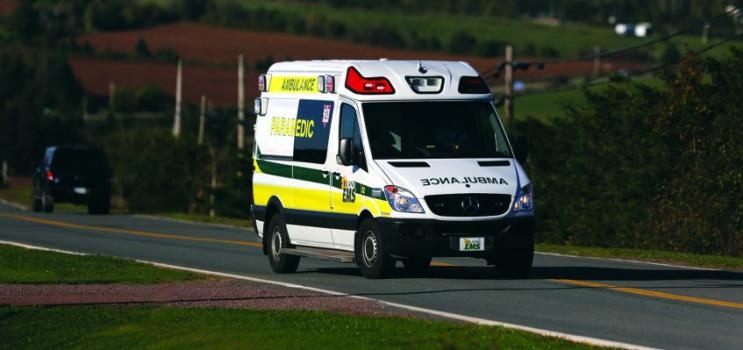UPEI nursing professor conducting research to connect families with critically ill relatives during off-Island transfers

Dr. Margie Burns, an assistant professor with the UPEI Faculty of Nursing, is conducting a research project about communication between paramedics and the relatives of critically ill patients when the patient is being transferred off-Island for advanced critical care services.
Her goal is to determine the feasibility of an indirect communication intervention whereby transferring paramedics will provide information to family members at two points during off-Island patient transfers.
“Over the last decade, academics and clinical practitioners have become increasingly aware that a patient’s critical illness and admission to an intensive care unit have significant and long-lasting negative consequences for them and their family members,” she said. “Family members can experience negative consequences such as anxiety, depression, complicated grief, and post-traumatic stress disorder. Recognizing these symptoms experienced by family members after a relative’s critical illness, the health-care and academic communities are studying this phenomenon, which they call post-intensive care syndrome-family (PICS-F).”
One of the most stressful events for critically ill patients and family members occurs when the patient must be transferred from their local hospital to a distant urban health-care centre for advanced critical care services.
“In addition to the stress of a relative’s illness, family members in rural areas describe a relative’s interhospital transfer as one of the most stressful times of the critical illness experience,” she said. “Families describe the transfer window, often lasting three to four hours, as a ‘black-out period’ with no communication with transferring paramedics, leaving family members to wonder if their relative is in pain, frightened, deteriorating, or dying.”
Dr. Burns is hoping to find 20 family members who will take part in the study, which started this month at the Queen Elizabeth Hospital emergency department. Between the hours of 8:00 am to 3:30 pm, Monday to Friday, eligible family members will be given a letter of invitation to take part in the project by the emergency department clinical nursing leader or social worker. If they wish to take part, the family member will scan a QR code on the letter and complete a survey. Once the survey is submitted, Dr. Burns will get an email notification and then activate the intervention by calling the clinical support desk paramedics at Island EMS.
Paramedics at the Island EMS clinical support desk in Charlottetown will contact the transferring paramedics at the halfway point to Halifax, Moncton, or St. John, and on arrival at the receiving centre. After receiving this update, the clinical support desk paramedics will contact the family member by telephone to provide this update and ask that person to complete a survey to measure stress and anxiety.
This system allows transferring paramedics in the ambulance to quickly communicate information to the clinical support desk paramedics, she said, minimizing interruptions in their care of the critically ill patient. The clinical support desk paramedic, who is not involved in the direct care of the critically ill patient, can take time to share information with family members and answer questions.
Burns said that once the study has been completed, the communication intervention will be refined and will require larger-scale testing to determine its effectiveness in reducing the stress and anxiety experienced by family members involved in interhospital transfers.